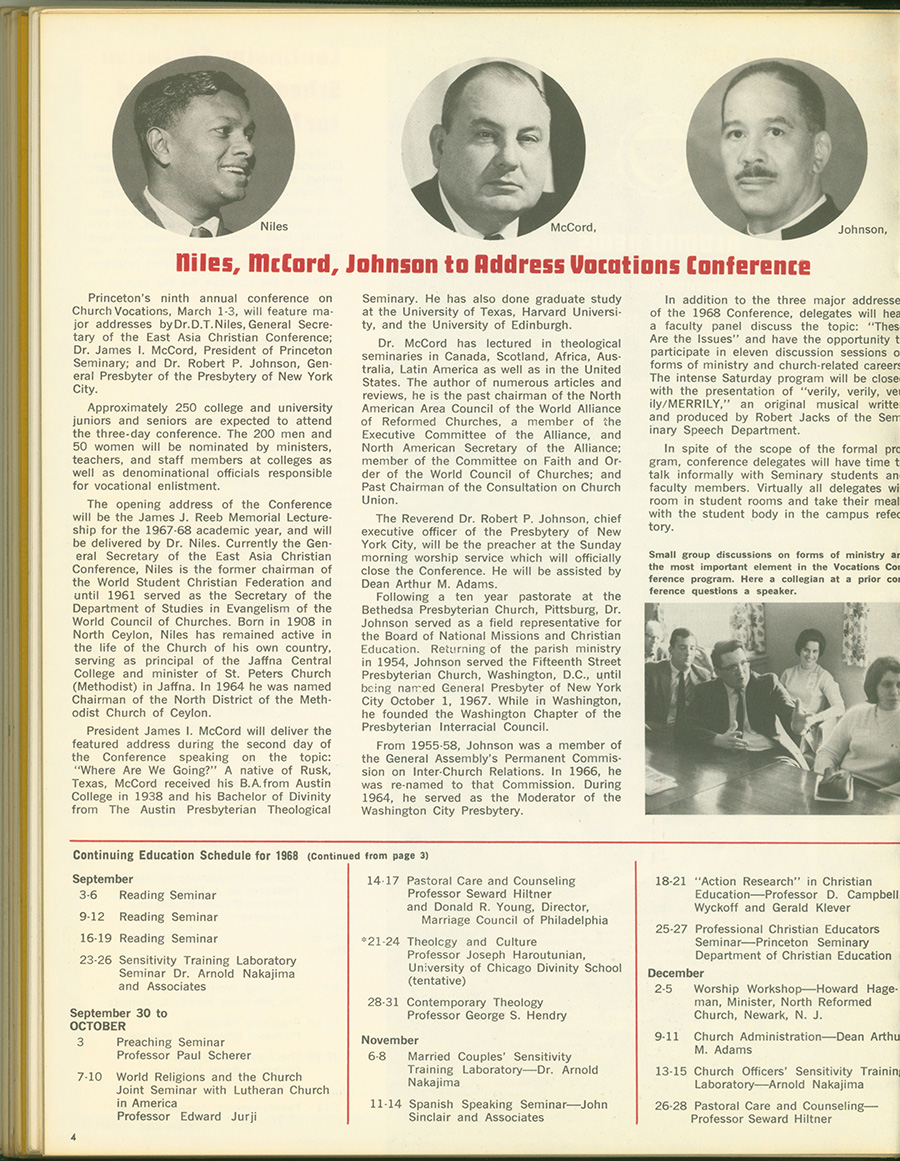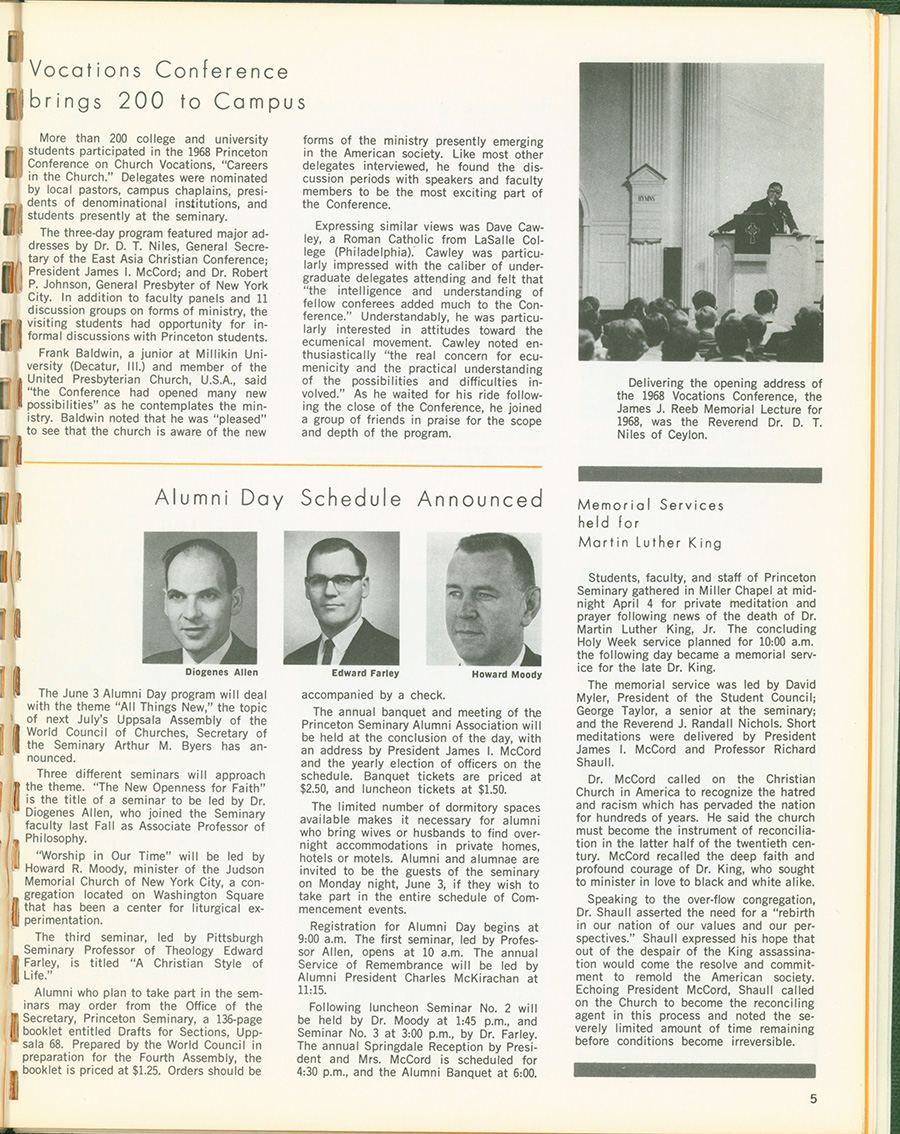For many in 20th century ecumenism, D.T. Niles embodied oikoumene – unity and engagement – in his cultural and religious heritage, global leadership, and personal life. His greatest legacy may emerge from his preaching. Lacy reminds us it was Niles who said, “Evangelism is witness. It is one beggar telling another beggar where to get food.” Through often deceptively simple stories Niles posed provocative challenges to fellow Christians and evangelists worldwide. In the third James Reeb Memorial Lecture, “Travailing for a New World,” (audio recording also available) delivered March 1, 1968, Niles urged listeners to overcome divisions and conflicts that continued three years after Reeb’s death.
“Jesus was crucified not only in James Reeb but in the man who wielded the club – not only in those two men, but in the total society and the total nation. It is everybody’s guilt that conspired together.
“There is a sense of helplessness, a sense of tragedy, a sense of anxiety because there is nothing you can do. Of course, there is something you can do. There is a great deal you can do.”
Daniel Thambyrajah Niles was born May 4, 1908, in Tellipalli, Jaffna, Sri Lanka. His mother died when he was one year old. Of Ceylon Tamil descent, Niles lived with his grandparents until he went to school. His grandfather, the Rev. Daniel Poor Niles was an early indigenous leader of the Methodist Church in Sri Lanka and a respected educator. Niles’ father was a lawyer and active Methodist lay leader who participated in Sri Lankan independence movements of the 1920s and 1930s. The elder Niles wanted his son to become a lawyer as well, but D.T., who was preaching by age 13, trained for the ministry. He attended Jaffna Central College and went on to United Theological College, Bangalore, India, where he received his bachelor of divinity degree in 1933 with first class honors. He earned his doctorate from the University of London.
Niles participated in the Student Christian Movement, an early factor in modern ecumenism. In 1938 he addressed the World Missionary Conference of the International Missionary Council at Tambaram at age 30. A key event in ecumenism and the theology of missions, Tambaram demonstrated the strength in numbers and message of so-called younger Asia churches. Niles was a leading participant. He opens his Reeb lecture with a recollection of Tambram.

In the early 20th century, Asian nationalism campaigns were developing alongside indigenous church movements in response to a privileged social and economic status of Christian missionaries. Niles’ ministry, rooted in early Methodist missionary traditions of pietism, evangelism, and social concern, builds on those traditions to address changes in Sri Lanka and elsewhere. His theology is “the outcome of a process of action and reflection.” (Furtado)
Political and social changes post World War II plus the emergence of the Church of South India in 1947 gave rise to a new era of autonomous younger churches. A visible leader in the movement, Niles drew from Karl Barth’s writings on dialectical theology. Guided by his mentor W.A. Visser ‘t Hooft, general secretary of the World’s Student Christian Federation, Niles sought to find common ground and basis for social action among Christians and other faith communities. Eulogizing him, Visser ‘t Hooft said, “He became a missionary to six continents and to all sorts and conditions of people.”
Niles_Amsterdam_1948IINiles delivered the keynote address at the 1948 founding of the World Council of Churches and became the first chairman of the WCC Youth Department. He also served as executive secretary of the Council’s Department of Evangelism. He held pastorates throughout Sri Lanka and married Dulcie Solomons. They had two sons who became ministers.
“People will come together not just around creeds; they come together also around commitments. In the whole civil rights struggle, people of different ways of thinking have come together around a common commitment.”
Niles preached at the opening service of the July 1968 Fourth Assembly of the WCC in Uppsala, Sweden after Martin Luther King Jr., who had been invited to preach, was assassinated that spring.
Niles_Uppsala_1968IIAn architect of the Church Union movement in Sri Lanka, Niles was general secretary of the National Christian Council of Ceylon and chairman of the World’s Student Christian Federation. He was chairman of the East Asian Christian Conference and a president of the WCC when he died in 1970. His book Reading the Bible Today has been translated into fifteen languages including Chinese and Arabic.
